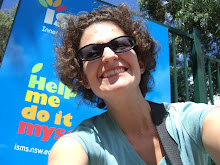This fascinating and entertaining video synthesises a plethora of information I have always wanted to know about the power of the internet and social media and presents it in an approachable, engaging and thought-provoking way.
Of the many examples of shifts that can have an effect on how people's behaviour as digital citizens, here are my five top trends and a discussion of how these behaviours point to the need for, and development of, information policy in organisations to deal with these behaviours successfully.
1. “Convergence is everywhere. It’s easier than ever to reach a large audience, but harder than ever to really connect with it.” An organisation such as a library requires a clear social media strategy in order to cut through the crowded social media landscape and address how it plans to connect with the masses. Which social networking tools will it use? How can these tools be utilised to not only reach a large audience but also connect with it on a deep and meaningful level?
2. “Newspaper circulation is down 7 million in the last 25 years. But in the last 5 years, unique readers of online newspapers are up 30 million ... (T)raditional advertising is in steep decline. Meanwhile, digital advertising is growing rapidly.” This trend has implications for libraries in which media they subscribe to and what form these subscriptions take and the need for policies that govern these decisions. It also forces libraries to consider how they market themselves and their services: notice boards and newspaper ads of the past versus modern day Facebook, Twitter, YouTube and podcasts or a combination of both.
3. "Wikipedia launched in 2001. It now features over 13 million articles in more than 200 languages." The concept of authorship has radically changed with the emergence of wikis in general and Wikipedia in particular, with users contributing to, and no one person claiming ownership over, its content. The validity of its content, however, cannot be guaranteed, but can be reasonably assured over a period of time. Knowledge no longer necessarily sits at the top of the academic hierarchy but belongs within the group of users (Mallan & Giardina, 2009). Is Wikipedia to today's students what the multi-volume encyclopedia was to students 20 years ago? This has tremendous implications for collection development policies within libraries. It also points to a need for information professionals to help library patrons discern authority and truth from information sources.
4. “In February 2008, John McCain raised $11 million for his U.S. presidential bid. That same month, Barack Obama attended no campaign fundraisers. Instead, Obama leveraged online social networks to raise $55 million in those 29 days.” How can politicians most effectively engage with their electorate, convince them to vote for them and compel them to donate money to their campaign? The traditional door-knocking, telephone calls and fundraising parties are now conducted via Facebook, Twitter and potentially Second Life. Could libraries not also convert social networking relationships into donation opportunities and other opportunities for support?
5. "The mobile device will be the world’s primary connection tool to the Internet in 2020." Can libraries use information about what they know people are reading, have borrowed from the library and have purchased for their Kindle and send personalised recommendations and notices about recently acquired library books, relevant upcoming author talks and book talks? Furthermore, how can organisations connect with their users via mobile technology whilst respecting privacy laws?
References
McLeod, S., Fisch, K., & Bestler, L. (2009). Did You Know 4.0. Viewed at
http://www.youtube.com/watch?v=6ILQrUrEWe8
Mallan, K. & Giardina, N. (2009). Wikidentities: Young people collaborating on virtual identities in social network sites, First Monday, 14(6), 1 June. Retrieved from
http://firstmonday.org/htbin/cgiwrap/bin/ojs/index.php/fm/article/viewArticle/2445/2213

No comments:
Post a Comment